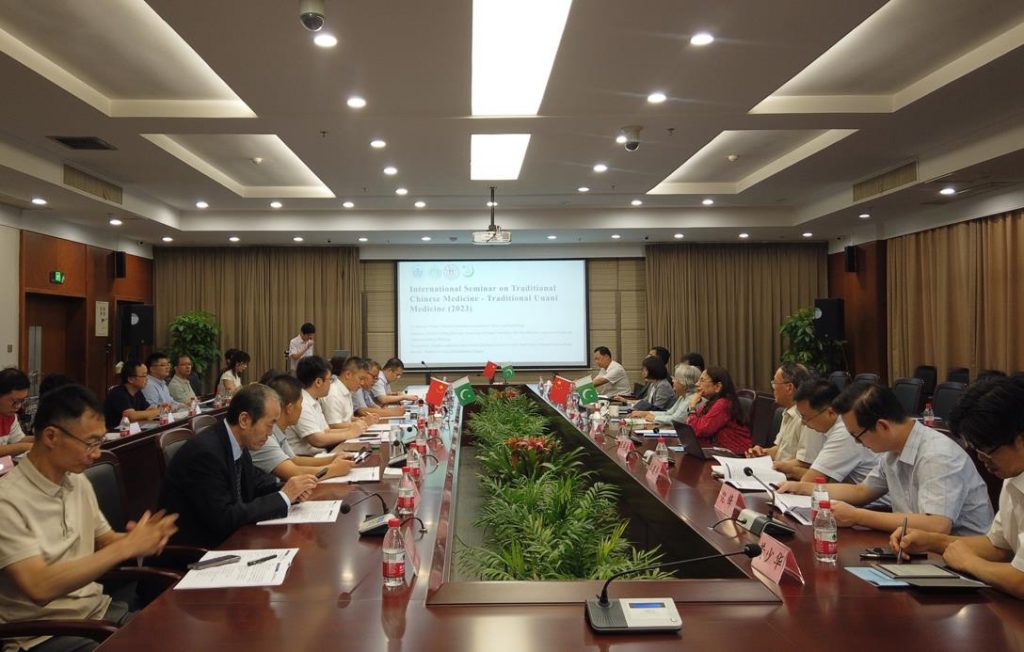“Traditional Chinese Medicine (TCM) and Unani Medicine are very effective in maintaining people’s health and playing an increasingly important role in the world,” highlighted Dr. Azra Fazal Pechuho, Provincial Minister, Department of Health & Population Welfare, Government of Sindh on July 17.
To further promote the modernization and internationalization of TCM and Unani, jointly safeguard the health of Chinese and Pakistani people, and jointly build a community of human health, two international seminars on Traditional Chinese Medicine-Traditional Unani Medicine were hosted at Ningbo University and Hunan University of Traditional Chinese Medicine respectively this month.
The consensus reached by the two seminars includes the establishment of TCM departments in three public hospitals in Sindh, Pakistan, and the establishment of an international clinical research base of TCM in ICCBS; Chinese medicine doctors from Beijing Hospital of TCM and Hunan University of TCM will be selected and sent to Sindh public hospitals to guide and train local western doctors, and Pakistani doctors will be sent to China for training.
Ningbo University and Karachi University plan to carry out space breeding and quality evaluation of medicinal materials and characteristic crops. Focusing on food and drug homologous substances, the two sides will jointly develop nutrition and health products suitable for pregnant and lactating women and infants in Pakistan and register and market them in accordance with Pakistani laws and regulations.
Ningbo traditional Chinese medicine has a long history and a rich heritage. The Institute of Drug Discovery Technology (IDDT) at Ningbo University and International Center for Chemical and Biological Sciences (ICCBS) at the University of Karachi have reached fruitful results in the field of traditional medicine research and development. In 2022, the two institutes jointly promoted the space carrying and breeding of traditional Pakistani medicine seeds in Shenzhou 14, which was highly praised by the foreign ministries of China and Pakistan.
Prof. Lv Chaofeng, Vice President of Ningbo University, presented that set up in 1986, as one of the universities in China’s “Double First-Class” Initiative, Ningbo University has established cooperation and exchanges with more than 170 higher institutions in more than 70 countries.
Prof. Liu Xinmin, WHO EAP member on traditional medicine &Chief Scientist of IDDT, who has been collaborating with Pakistan for over 2 decades, said that “IDDT will continue to carry out in-depth cooperation in R&D, clinical trial and registration of herbal products in Pakistan, promote herbal products enter Pakistan and OIC countries, making traditional medicine more modern.”
Prof. Iqbal Choudhary, Director and Distinguished National Professor and Coordinator General of COMSTECH, Vice President of TWAS (Third World Academy of Sciences), also Director of ICCBS, emphasized the significance of promoting traditional medicine in the OIC world of 1.9 billion people on 4 continents. He added that “the OIC world faces a host of security and development challenges as well as menace of violent extremism. In addition to national efforts, there is a need for developing partnerships between the most STI influential including China, for collective development.”
About 40 experts from universities, hospitals and biomedical companies attended the seminar and shared their views on Traditional Chinese Medicine-Traditional Unani Medicine exchanges.





